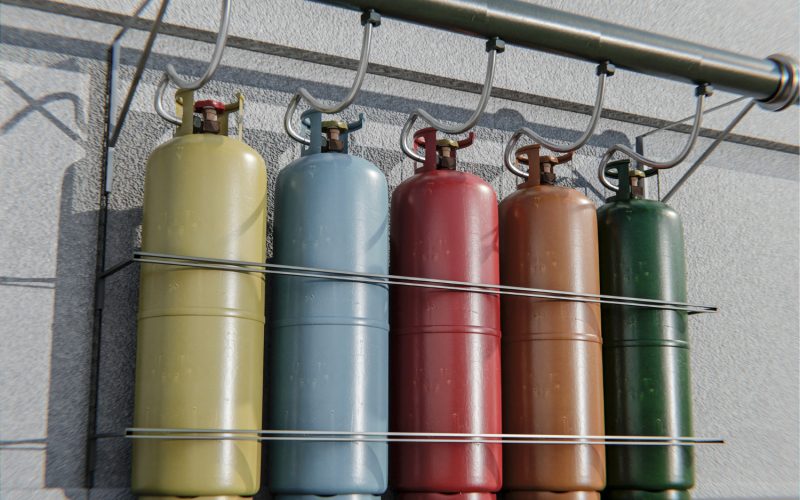Proper storage and safe handling of a hydrogen cylinder are essential to prevent accidents and ensure workplace safety. As hydrogen is a highly flammable gas, it requires strict precautions, including secure storage in a well-ventilated area away from heat sources and proper cylinder positioning to avoid leaks or damage. Always use approved regulators and avoid excessive force when opening valves. This guide shares key safety protocols, inspection routines, and emergency procedures to minimize risks and ensure compliance with regulations.
Safe Handling Techniques: How to Transport and Use a Hydrogen Cylinder Securely
When transporting a hydrogen cylinder, always ensure it’s secured in an upright position using appropriate restraints, such as straps or chains, to prevent movement. Cylinders should never be rolled, dropped, or dragged, as physical damage can compromise their structural integrity. Always check that the valve cap is firmly in place to protect the valve from accidental impact. When lifting or moving a cylinder, use proper handling equipment, such as a cylinder cart, to minimize strain and reduce the risk of injury.
During use, keep the cylinder in a well-ventilated area away from heat sources, open flames, and electrical sparks, as hydrogen is highly flammable. Ensure the work area is free from combustible materials to reduce fire hazards. Open the valve slowly to prevent sudden pressure surges in the system and use regulators specifically designed for hydrogen gas to ensure safe operation, as per standards set by organizations like OSHA (Occupational Safety and Health Administration). Avoid using lubricants or grease on any cylinder components, as certain substances can react with hydrogen and pose a safety risk.
Inspect the hydrogen cylinder and its connections regularly for leaks by applying a leak detection solution around the valve and fittings. If a hissing sound or bubbles appear, shut off the valve immediately and address the issue before use. Store cylinders in a designated area when not in use, ensuring they remain upright and secured to prevent accidental tipping. Regularly inspect connections and valves for leaks using a leak detection solution. If you detect any leaks, immediately shut off the valve and address the issue before proceeding. By following these precautions, the risk of leaks, explosions, and injuries can be significantly reduced.
Important Safety Regulations and Best Practices for Storing Hydrogen Cylinders
Proper storage of a hydrogen cylinder is essential to ensure safety and compliance with industry standards, such as those outlined by the National Fire Protection Association (NFPA). Because hydrogen is a highly flammable gas, taking strict precautions is necessary to prevent potential hazards. Cylinders should always be stored in a well-ventilated area to prevent the accumulation of leaked gas, reducing the risk of combustion. Ensure the storage location is away from heat sources, open flames, electrical equipment, and direct sunlight, since exposure to high temperatures increases internal pressure and can lead to leaks or ruptures.
To minimize risks, store cylinders upright and secured to a stable support using appropriate restraints such as chains or brackets. This prevents falls and accidental damage to the valve, which could cause a sudden release of high-pressure hydrogen gas. Maintain a safe distance from oxidizing agents, combustible materials, and corrosive chemicals, as these substances can pose additional hazards. Cylinders should also be stored away from potential ignition sources and incompatible materials, in accordance with NFPA guidelines.
Regularly inspect cylinders for visible signs of damage, rust, or leaks before storage and use. If a leak is suspected, move the cylinder to a safe and ventilated area and report the issue immediately. Use only approved storage areas that comply with fire codes, ventilation requirements, and local regulatory guidelines. These areas should meet specific fire resistance and ventilation standards, as detailed in local fire safety regulations. Label all cylinders properly, indicating whether they are full, empty, or in use, and ensure that designated personnel are trained in proper handling procedures. Cylinders should be clearly marked as full, empty, or in service to avoid confusion and potential hazards.
By following established safety protocols, utilizing proper storage equipment, and adhering to industry regulations, the risks associated with hydrogen cylinders can be significantly reduced. Always refer to specific guidelines provided by safety authorities to ensure compliance with legal and workplace safety requirements. Proper storage and handling of hydrogen cylinders are crucial for maintaining safety and efficiency in any operation – discover the essential guidelines to ensure compliance and best practices: hydrogen cylinder.
Frequently Asked Questions (FAQs)
What Should I Do If I Detect a Hydrogen Leak?
If you detect a hydrogen leak, immediately shut off the cylinder valve. Evacuate the area and ensure there are no ignition sources nearby. Report the leak to the appropriate personnel and follow emergency procedures as per your facility’s safety plan. Do not attempt to repair the leak yourself.
What Is the Recommended Ventilation Rate for Hydrogen Cylinder Storage Areas?
The recommended ventilation rate for hydrogen cylinder storage areas depends on the size of the storage area and the potential leak rate. Consult NFPA 55, Compressed Gases and Cryogenic Fluids Code, or local regulations for specific ventilation requirements.
What Type of Regulator Should I Use with a Hydrogen Cylinder?
Always use a regulator specifically designed and approved for use with hydrogen. These regulators are constructed of materials compatible with hydrogen and are designed to handle the specific pressure requirements of the gas.









